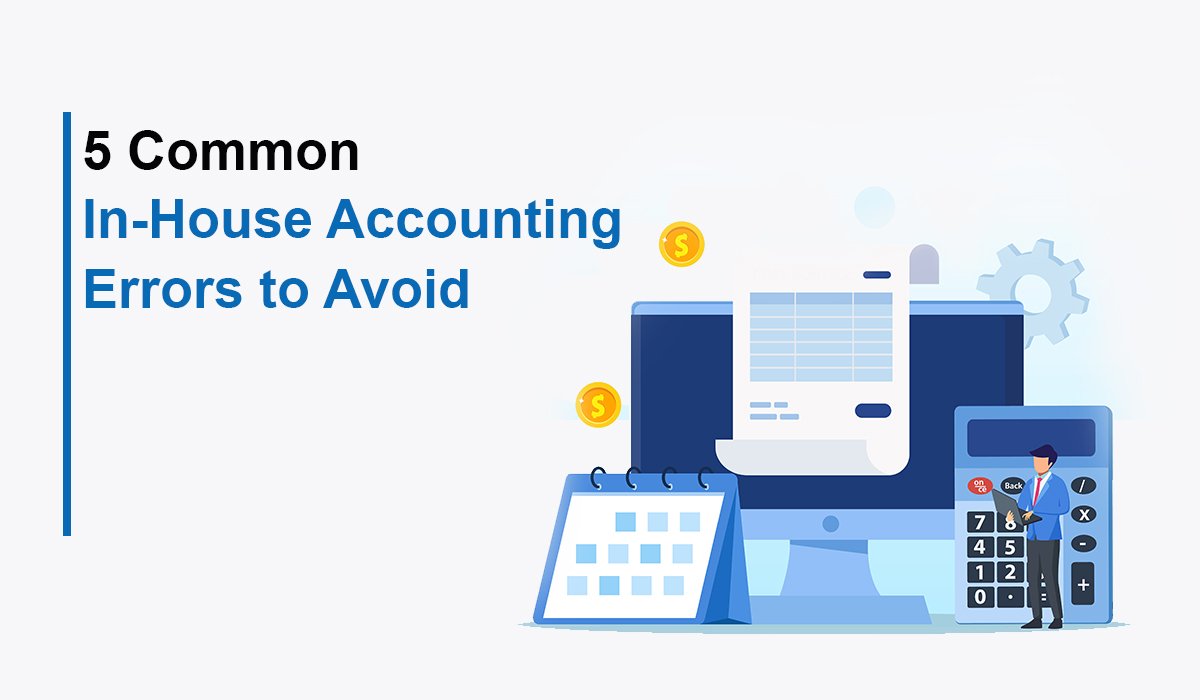Managing in-house accounting can be a challenging task for businesses of all sizes. While it provides direct control over financial activities, it’s also prone to several common accounting errors that can have costly consequences.
For both the start-up firm and the mature firm there are so many risks inherent in such a model crucial to the overall financial wellbeing of the firm. In this blog, you will learn five bad practices often made in-house accounting and how to avoid the pitfalls.
1. Inadequate Record-Keeping
Inadequate record-keeping is probably one of the most common errors that financial companies make in accounting. Employers usually leave record-keeping for a long time or forget certain records hence they are liable to discrepancies and hence business errors. This problem can occur due to improper record storage, unstructured data input procedures, or relying on paperwork.
Why It Matters:
A business must maintain proper records because financial statements, tax returns, and records of cash flow need to be recorded. Missing or disorganized records can result in:
Based on these implications, it is now obvious that unfair financial reporting can form part of it.
- Tax penalties
- Lost chances for deductions
How to Avoid It:
- One of many ways that people/organizations employ to enhance the way records are being made is through the use of; Digital accounting software.
- This census student has hands-on experience in data entry procedures and the type of filing system we use.
- The records should be complete and accurate thus conducting regular audits will help achieve that.
2. Neglecting Tax Compliance
Compliance with taxes is among the critical aspects of accounting which many organizations appear not to care about. Failure to adhere to the generally set standards of taxation laws or failure to adhere to certain due dates leads to charges such as penalties or even an audit.
Why It Matters:
People cheat on their taxes, which have colossal monetary and catastrophic brand-image consequences. Common tax-related mistakes include:
- Taxes are filed in the wrong places
- Where income and expenditure are classified on the wrong side of the ledger
Failure to collect or pay the sales tax
How to Avoid It:
- Continuing to be informed about tax laws and regulations.
- Utilise standard tax software that can easily calculate and process every required filing.
It is also important to speak with tax advisors to make certain that all the right rules are being followed while allowing the maximum amount of deductions.
3. Overlooking Reconciliation
Bank reconciliation is one of the basic accounting procedures that check your records with your banker’s statement. Again, though, this is frequently overlooked and there can be unnoticed accounting errors.
Why It Matters:
Reconciling accounts helps:
- Identify signs of mistakes or embezzlement
- Possess good cash flow statements
- Hence avoid situations such as overdrafts, and any other financial complications.
How to Avoid It:
- It is recommended to reconcile at unearth your perceived frequency: daily, biweekly, monthly, or quarterly depending on your needs.
- Only go to accounting tools with an in-built reconciliation feature.
- Since reconciliation works involve sensitive transactions, reconcile these tasks with experienced team members.
4. Underestimating the Complexity of Payroll
Outsourcing of payroll processing may seem to be a simple idea, but entails numerous computations, withholding of taxes as well as consideration of the legal provisions on employment. Payroll accounting errors are negative because they cause dissatisfied employees or cause legal troubles.
Why It Matters:
Payroll errors in accounting, such as underpayments, overpayments, or incorrect tax withholdings, can cause:
- Employee dissatisfaction
- Legal disputes
- Regulatory fines
How to Avoid It:
- Use reliable payroll software to automate processes.
- Stay informed about changes in labor laws and tax requirements.
- Regularly review payroll reports for accuracy.
5. Lack of Expertise
Accounting is a specialized field requiring technical knowledge and attention to detail. Many businesses make the mistake of assigning accounting responsibilities to untrained or overburdened employees.
Why It Matters:
Without proper expertise, your team may:
- Misinterpret financial data
- That is, miss opportunities to recognize inaccuracies or wrongdoing.
- Readily turn over their financial management with poor financial consequences
How to Avoid It:
- Ensure that you get the right staff to work as accountants in your business.
- Make it your practice to regularly update and recertify your accounting personnel.
If you’re looking for expert guidance and support for mistakes to avoid, an outsourced accounting service for example Lints Advisors could help.
Outsourcing Services: A Vital Reason For Accounting Companies
This is good because hiring outsourcing professionals to handle your accounting problems can effectively eliminate these errors in accounting. Such consultants, such as Lints Advisors, work in the sphere of offering financial services, which will help you avoid distractions from your primary business. By partnering with experts, you can:
By partnering with experts, you can:
- Ensure compliance with financial regulations
- Improve accuracy in financial reporting
- Save time and resources
Final Thoughts
Mistakes to avoid being made in-house may put the financial future of your business at risk. Some of the areas, in which people get it wrong frequently include record management, poor tax adherence, and underestimation of payroll issues are some of the ways that you can protect your business. But if you are building pressures from managing all these tasks in-house, you may need to turn to an expert accountant, like Lints Advisors.
With extensive experience in accounting services, Lints Advisors can help you minimize accounting errors, ensure compliance, and streamline your financial processes. Contact us today to learn more about how we can support your business.
Financial Sector Trends: What the 2025-26 Budget Reveals
The Union Budget 2025-26, unveiled by Finance Minister Nirmala Sitharaman, has set the stage for transformative changes in India's financial sector. The upcoming budget concentrates on developing economic expansion while making credit options more accessible [...]
Empowering Women: Financial Planning for 2025
In today's dynamic financial world, empowering women through tailored financial planning is more crucial than ever. Women often face unique financial challenges, including longer life expectancies, career breaks for caregiving, and persistent wage gaps. Addressing [...]
Why Is Form 1040 Important for Accounting Firms?
When it comes to the world of taxes, Form 1040 holds a central position. It is often referred to as the "U.S. Individual Income Tax Return" and serves as the primary document taxpayers use to [...]





